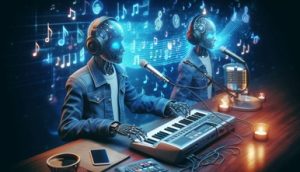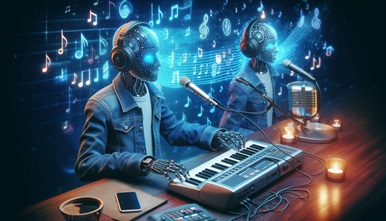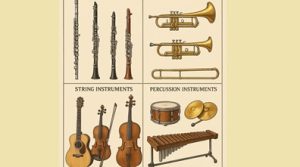How AI Is Transforming Music Creation In 2025
How AI Is Transforming Music Creation In 2025
The Soundscape of Tomorrow Powered by AI
Artificial Intelligence is no longer a futuristic concept; it has become a force that propels industries all over the world, with the music industry riding that tide of change.

In 2025, AI not only assists with music-making; it helps in redefining the very process.
From composition through melody to mastering of the final track, AI is involved in helping the artist create, collaborate, and connect with audiences in new ways.
How AI Is Transforming Music Creation
AI technology becomes more advanced and accessible; its usage is becoming common among all kinds of studios, professional and home.
But like every revolution, it harbors both excitement and pressing questions:
What does creativity mean when machines write the music? How do we label originality in a world where AI overlaps with the songwriting process?
How AI Is Transforming Music Creation: Exploring the Future of Music through Artificial Intelligence
Artificial Intelligence: The Future of Music
Reverberating the Creative Process via AI
The music creation journey has traditionally been deeply human—driven by emotion, experience, and cultural expression.
Now, AI is stepping in not to replace this human touch, but to extend it. Imagine describing a vibe or humming a tune and watching AI instantly turn it into a fully realized composition.
No expensive software, no lengthy sessions-just inspiration and instant transformation.
AIs exist outside the bounds of genre, bias, and trends, freely experimenting and creating an unlimited playground of sounds and styles for artists.
With the ability to flow beyond traditional restrictions, artists are given the space to push their creativity further than they have ever known.
How AI Is Transforming Music Creation: Collaboration or Competition
AI is both an adjunct tool and creative partner, and its integration thus far has reworked the way musicians work.
For some, it is a collaborator that enriches their artistic vision. For others, it is an enemy, contending with their sense of authenticity.
The question, therefore, is no longer what AI can achieve; rather, it is how artists work together with it.
How AI Is Transforming Music Creation: Sound of the Future
AI will demand attention as one of the forces that will shape the music industry in the forthcoming years.
It democratizes music production, grants power to independent creators, and opens up new modalities of expression.
But, it also forces us to revisit our definitions of creativity, originality, and artistic ownership.
2025 is a shifting point in music
The time when human talent and AI unite and amplify each other. Together, they aren’t just creating music; they are creating the history.
How AI Is Transforming Music Creation: Revolutionizing the Art of Music Composition
Artificial Intelligence, today, is changing the face of music composition.
In applying machine learning, AI systems are allowed to analyze extensive body collections of music so as to detect patterns in melodies, rhythms, harmonies, and chord progressions.
Drawing on this information, those systems are capable of creating entirely new compositions.
In addition, some AI platforms empower musicians to control the generation of their music by providing parameters for customization, such as genre, mood, and tempo, which ultimately leads to the creation of music tailored to their choice.
How AI Is Transforming Music Creation: Functions of AI in Music Creation
Enhancing Creative Powers
AI is not meant to replace an artist but rather to serve as an ally in his creative endeavors.
By producing new and perhaps random musical ideas, AI presents yet another wellspring of inspiration. Artists can take those AI-generated snippets and refine them, expanding on melodies and harmonies they may not have thought of otherwise.
Streamlining the Production Process
Production processes in conventional music-making take time, from composition to mixing to mastering.
With the help of AI tools, much of this work is automated, leaving artists free to engage in creative endeavors instead of spending precious hours on technicalities.
AI in production can create beats, shape sounds, and polish audio.
Lowering Thresholds for Creative Production
AI systems wipe away even the last vestige of prior music production experience between the artist and a finished product.
This has opened up an explosion of creativity through a large set of means-making methods, creating a much more inclusive music marketplace in favor of all the starving new artists across the globe.
Tailored Music Recommendations
AI is also the one transforming the way we listen to music. Listening habits are then used by streaming platforms like Spotify and Apple
Music with AI algorithms to create an author’s playlist. These tailored experiences then help listeners discover new music that fits well with their tastes and improves engagement.
AI-Generated Hits: The Future of Best-Selling Songs?
The traditional understanding of a hit, one that enthralls millions, could change in a different era: the soon coming of a time when everyone will ask, ‘What about the AI cut?’ Or even better, when AI can write its lyrics, produce its beats, and master its tracks.
That’s the interesting power of AI: no genre defines it, no norm shackles it. It creates freely, so machines can produce music that may compete with human-generated hits.
Important Roles of AI in Music Production
- Composition: AI creates its original melodies, lyrics, and chord progressions and does it differently from every possible mood and genre.
- Production: Advanced AI programs such as LANDR and iZotope are bringing automix, automaster, and sound design to the professional means of production.
- Performance: AI can make very realistic live performances of instruments and vocals, hence an artist’s musical visions can be realized without an array of actual musicians.
AI in Content Creation
- Automated Video Generation: AI is also taking strides into video production. Platforms like YouTube have incorporated AI into their systems to aid creators in generating ideas, backgrounds, and even short clips for easier content creation.
- Music Composition-from simple to several prompts, AI algorithms will be used to generate music based on the inputs someone gives, therefore offering a quick and easy option for people composing their own melodies from scratch.
How to Increase in User Interaction with AI
- Adaptive Streaming: AI can optimize the qualities of streaming across speed and device capabilities so that the end-user gets totally satisfied.
- Improved Accessibility: Real time transcriptions and translations have proven to make content accessible with the help of AI, since it gives automatic subtitles and audio descriptions for a wider pool of users.
How AI is Empowering Musicians to Unlock New Creative Potential
AI is emerging as a most successful technology for musicians to be able to create new spaces for developing their creativity and production.
AI is not going to replace any art talent; rather, it is an artist’s best friend in knocking down all barriers to get the creative juices flowing and the boundaries pushed outward.
Major Benefits to Musicians
- Greater Accessibility: AI tools can produce high-quality music for even those musicians without necessary budgets or technology backgrounds.
- Increased Efficiency: Automating arrangement and mastering production tasks, AI will allow musicians to focus their time on actual creative work, thereby facilitating a faster production process overall.
- Fresh Inspiration: AI-generated compositions probably bring something new to the world of the blocked artist and lead them to completely different parts of music, presenting strange concepts that may not have arrived at in a regular route.
Challenges and Considerations about AI in Music
- Legal and Ethical Questions
One major challenge surrounding AI-generated music are questions regarding copyright ownership. Who will retain rights for music generated by AI-the developer, the user, or the AI itself? This uncertainty has raised important discussions about intellectual property rights and their applicability in AI-generated content.
- The Worry of AI Replacing Human Artists
With continuous motion on the floor of advancements across the world, some agitate for their concern that human musicians, composers, and producers might eventually be replaced by the AI. It is important for this reason to distinguish that the way AI generates music is unlike the emotional depth, context, and storytelling with which human musicians give life to their works. The brighter path forward would be to allow AI to facilitate human creativity, not to suppress it.
- The Threats of Over-Reliance on AI
A lot of apprehension surrounds the idea that excessive reliance on AI-generated music might breed a shortage of originality and innovation. With the same sound coming from an AI, music proposed by humans will lose the unique artistry otherwise introduced by the human musician in crafting its creation. Thus it is critical to find that balance in criteria that discriminates teen human creativity against AI assistance.
How Musicians Are Incorporated with AI in Their Work
Many artists are taking in AI as a collaborator rather than an enemy. From the AI appropriation of concerts over studio production, musicians are deploying AI to supplement their work and test the limits of creative formation. Some famed musicians whose work has already embedded AI include:
- Taryn Southern: An AI music pioneer, one of the first musicians to release one album with assistance from the AI.
- Grimes: Has declared her use of AI for producing innovative sounds and compositions.
- David Guetta: Known for the integration of AI tools to enhance beats and melodies in the field of electronic music production.
Preparing for the Future of AI in Music
As AI technology continues to evolve, musicians must adapt to be ahead of the curve.
AI opens new creative possibilities, yet it demands a careful approach if one is to preserve artistic integrity.
Some steps to prepare for the AI-enhanced future:
- Learn and Explore: Keep yourself updated on the latest AI tools and how they enhance your process of making music.
- Mindful Integration: Use AI in any case for monotonous or technical tasks, so as to ensure that the essence of artistic and creative expression is preserved.
- Put Up The Human Element: Focus on emotional storytelling, live performances, and distinguishing parts of music-the three things that AI cannot replicate.
Frequently Asked Questions: AI’s Impact on Music Creation in 2025
Find out what questions musicians have concerning how AI will shape the future of sound.
Which AI tools will become basic for musicians by 2025?
Artists should explore places like Amper Music for composition, LANDR for mastering, and AIVA for orchestration.
From these options, various pathways to aiding inspiration and production max credit emerge.
Will AI completely replace human musicians?
AI functions as a partner, not a substitute. While it can create music, it does not express the emotional depths or personal storytelling of human musicians.
Through what ways can AI support independent emerging artists?
By serving as a great equalizer, AI provides production tools that are usually too expensive for independent musicians to afford.
Thus, they can produce professional-quality tracks and obtain exposure to global platforms.
What are possible negative effects of an over-reliance on AI for music production?
The more AI is utilize, the more it would dilute uniqueness among music.
For originality’s sake, AI is a collaborative sort of tool for the musicians, instead of taking over the entire creative function.
Conclusion on How AI Is Transforming Music Creation:
By 2025, AI will totally revolutionize the way music is create and introduce a whole new set of creative possibilities for musicians.
Such opportunities, of course, need to remain cognizant of the ethical implications of AI.
Ultimately, while there will always be the input of AI in music production, the future of sound will always remain in the hands of artists, who will continue to impart their human essence and emotions into it.




